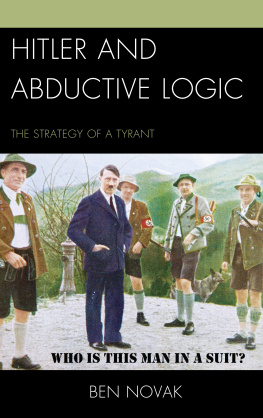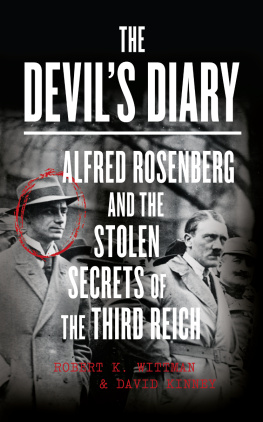Hitler and Abductive Logic
Hitler and Abductive Logic
The Strategy of a Tyrant
Ben Novak
LEXINGTON BOOKS
Lanham Boulder New York Toronto Plymouth, UK
Published by Lexington Books
A wholly owned subsidiary of Rowman & Littlefield
4501 Forbes Boulevard, Suite 200, Lanham, Maryland 20706
www.rowman.com
10 Thornbury Road, Plymouth PL6 7PP, United Kingdom
Copyright 2014 by Lexington Books
All rights reserved. No part of this book may be reproduced in any form or by any electronic or mechanical means, including information storage and retrieval systems, without written permission from the publisher, except by a reviewer who may quote passages in a review.
British Library Cataloguing in Publication Information Available
Library of Congress Cataloging-in-Publication Data
Novak, Ben, 1943
Hitler and abductive logic : the strategy of a tyrant / Ben Novak.
pages cm
Includes bibliographical references and index.
ISBN 978-0-7391-9224-5 (cloth : alkaline paper) -- ISBN 978-0-7391-9225-2 (electronic)
Hitler, Adolf, 1889-1945--Psychology. 2. Heads of state--Germany--Psychology. 3. Heads of state--Germany--Biography. 4. National socialism--Psychological aspects. 5. Germany--Politics and government--1933-1945. 6. Ideology--Germany--History--20th century. 7. Abduction (Logic) 8. Reasoning. I. Title.
DD247.H5N658 2014
943.086092--dc23
2014004471
 TM The paper used in this publication meets the minimum requirements of American National Standard for Information Sciences Permanence of Paper for Printed Library Materials, ANSI/NISO Z39.48-1992.
TM The paper used in this publication meets the minimum requirements of American National Standard for Information Sciences Permanence of Paper for Printed Library Materials, ANSI/NISO Z39.48-1992.
Printed in the United States of America
Chapter 1
The Historical Problem of Hitler
The question that initiated this study was a simple question that mystified Adolf Hitlers contemporaries and has subsequently baffled historians and biographers: Why was Hitler successful in his rise to power? Initially, this seems to be a straightforward question, answered by simply describing: (1) who this man was; (2) what he did; and (3) how he did it. However, most biographers and historians have answered only one of these three questions, namely, what he did. As for the other two questions, they have proved unable to arrive at consensus or provide satisfactory answers.
H. R. Trevor-Roper was the first postWorld War II historian to recognize the mystery constituted by Hitlers rise to power and to identify these two unanswered questions as the essential elements of the continuing mystery of Hitler. Trevor-Roper raised these in a lengthy essay published in 1953, entitled The Mind of Adolf Hitler, which begins with the stark question: Who Was Hitler? He then goes on to castigate his fellow historians for failing to answer that question, as well as for failing to answer the second question constituting the mystery: How did he do it? Indeed, Trevor-Roper accused historians of evading these questions. It is worth quoting him more fully, for he minces no words:
Who was Hitler? The history of his political career is abundantly documented and we cannot escape from its terrible effects. And yet,... how elusive his character remains! What he did is clear; every detail of his political activity is nowthanks to a seizure of documents unparalleled in historyhistorically established; his daily life and personal behavior have been examined and exposed. But still, when asked not what he did but how he did it, or rather how he was able to do it, historians evade the question, sliding away behind implausible answers.
In the intervening half century, despite an overwhelming amount of scholarship devoted to these two questions (Robert G. L. Waite has opined, It seems likely that more will be written about Adolf Hitler than anyone else in history with the exception of Jesus Christ.), no advance has been made in answering them or solving the mystery.
Eberhard Jaeckel pronounces the question How could Hitler have come to power? to be the seminal question of the twentieth century.
The present status of this mystery, especially regarding the two unanswered questions identified by Trevor-Roper, is well reflected in three major works published as the twentieth century was ending. In 1997, John Lukacs published The Hitler of History, a survey of the major historical scholarship and research relating to Hitler. Lukacs was motivated to conduct his study because he felt that the same two questions that Trevor-Roper had identified in 1953 were still unanswered: There is no disagreement about this among historians, writes Lukacs, What they ask from the recordand from themselvesare two questions: How could Hitler have come to such power? And: What kind of a man was he?
The following year a second work appeared demonstrating the continuing mystery of Hitler. In 1998, Ron Rosenbaum, a journalist who sensed a significant story in the failure of historians to solve the mystery of Hitler, published Explaining Hitler: The Search for the Origin of His Evil. The story that Rosenbaum reports is the almost-scandal among historians that Hitler remains unexplained. For his book, Rosenbaum interviewed many of the most prominent Hitler scholars, recording his surpriseand their frustrationthat the most fundamental historical and moral questions about this man remain unanswered. Rosenbaum identifies these two yet unanswered questions as (1) The real search for Hitlerthe search for who he was, and (2) the question of his advent and success. Rosenbaum then records in eloquent language the laymans amazement at the failure of historians to find any coherent or consensus answers to these questions:
Is it conceivable, more than half a century after Hitlers death, after all that has been written and said, that we are still wandering in this trackless wilderness, this garden of forking paths, with no sight of our quarry? Or, rather, alas, with too many quarries: the search for Hitler has apprehended not one coherent, consensus image of Hitler, but rather many different Hitlers, competing embodiments of competing visions, Hitlers who might not recognize each other well enough to say Heil! if they came face to face in Hell.
Among the most significant of the interviews recorded by Rosenbaum is that of H. R. Trevor-Roper, who expressed his despair that the mystery of Hitler has not yet been solved, and may never be solved, for [t]here is something irrational at the heart of Hitlers appeal, something not explicable by the ordinary tools of historical and psychological analysis.
Finally, in 1999, the last year of the twentieth century, Ian Kershaws Hitler: 1889-1936: Hubris appeared. Hailed as the classic Hitler biography of our time,
Describing Hitlers mind as a void and his private life as a black hole, Kershaw seeks to avoid answering the two questions of who this man really was and how it was that Hitlerof all peoplewas so phenomenally successful in politics. Hitler, in Kershaws telling of his life, was an unperson who only existed in the effects he caused.
Thus Kershaw completely sidesteps, avoids, or evades the questions posed by Trevor-Roper, Lukacs, and Rosenbaum. Instead, he posits as his first premise that [t]here was no private life for Hitler. Thus Kershaws approach leads us right back to where the historical profession was in 1953, facing the same unanswered questions posed by Trevor-Roper, namely,
Who was Hitler before he created the mask, assumed the persona, and became the Fuehrer?
Who was Hitler when he first envisioned himself as the Fuehrer, and who with cunning and calculation set out to achieve it?
How was it that this strange man could get anyone to believe that heof all peoplewas the future leader of Germany?
Next page
















 TM The paper used in this publication meets the minimum requirements of American National Standard for Information Sciences Permanence of Paper for Printed Library Materials, ANSI/NISO Z39.48-1992.
TM The paper used in this publication meets the minimum requirements of American National Standard for Information Sciences Permanence of Paper for Printed Library Materials, ANSI/NISO Z39.48-1992.